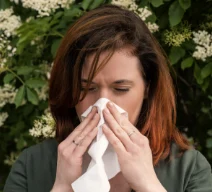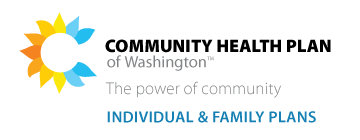Be Well: Spring 2025
A quarterly newsletter to help you maximize your health insurance benefits and reach your health goals with your CHPW Individual & Family Plan. The team at CHPW is here to support your health journey with tips and information you can use.
Missed our previous newsletters? You can find them in our Be Well newsletter archive.
All about bills

We get it, health insurance can be confusing. But don’t worry—we’re here to help you make sense of it every step of the way.
One question we often hear from members is about what they will need to pay and why. Health insurance bills can be tricky at first, but once you understand the different types of costs, managing them becomes easier.
Here’s a breakdown of the main types of costs you might see. Keep in mind that costs vary depending on the type of plan you have.
Premium: This is the monthly payment you make to have health insurance. Whether or not you go to a doctor, you still need to pay this every month. CHPW premium invoices are always due on the 23rd of the month. (Note: Premiums on some plans could be as low as $0 if you meet certain income requirements.)
Copay: This is a fixed amount you pay when you visit the doctor or pick up a prescription. For example, you might pay $20 each time you see your doctor or $10 for an eyedrop prescription. It’s your share of the cost, and the rest is covered by your insurance.
Deductible: This is the amount you pay out-of-pocket for medical services before your insurance starts to pay. For example, if you have a $1,000 deductible, you will pay the first $1,000 of medical costs before your insurance helps. (Note: Many services such as primary care, mental health office visits, specialty care, urgent care, and generic drugs are not subject to a deductible—meaning you don’t have to pay the deductible amount before your insurance starts covering them.)
Coinsurance: After you meet your deductible, coinsurance is the percentage of costs you still have to pay for services. For example, let’s say you sprain your ankle and your doctor orders crutches that cost $100. You might pay 20% of the bill ($20), and your insurance covers the other 80% ($80).
Maximum Out-of-Pocket (MOOP): This isn’t actually a bill but rather the most money you’ll have to pay in a calendar year for covered health care services. Once you reach this limit, your insurance covers 100% of the costs for the rest of the year.
For more information on understanding your health insurance bills, check out this CHPWConnections blog post.
Staying on top of payments
 Now that you have the basics down, let’s make it even easier for you to stay on top of your bills. At CHPW, you can pay your bills in three easy ways: online, by phone, and by mail—whichever works best for you.
Now that you have the basics down, let’s make it even easier for you to stay on top of your bills. At CHPW, you can pay your bills in three easy ways: online, by phone, and by mail—whichever works best for you.
Many members find that setting up online payment makes it easier to stay on top of their bills. It’s convenient, quick, and means you don’t have to worry about mailing checks or rushing to make a payment before the due date.
CHPW’s online bill payment system is E-Bill Express. By signing up for an account, you can see your monthly invoices, make one-time payments, or set up automatic payments so you never miss a due date.
E-Bill Express tips
Setting up automatic payments: After logging in, select “Autopay,” then click “Create New Recurring Payment.” Follow the prompts on the set-up screen and click “Finish.”
Forgot Password: On the Welcome page, click “Password Help?” Enter your Login ID and email address used during enrollment and click “Send My Password.” An email will be sent to you with a temporary password. Enter your Login ID and the temporary password from your email into the Password field on the Welcome page and click “Login.”
Locked Out & Password Reset: If you enter your password incorrectly three times, the system will lock you out. Click on “Contact Us” on the bottom of the Welcome page for contact information and ask CHPW to unlock you. You do not have to change your password unless you cannot remember it.
Cancel ACH or Credit Card Payment: Go to created payment method under Pay My Bills -> History -> Payment History. From the Home Screen click the red X under “Previous payments.” Confirm cancellation of payment by clicking the green box.
Note: ACH payments can only be canceled the same day (before payment cut-off time) the payment has been made. A credit card payment can be canceled up to 180 days after payment has been made.
Our Pay Your Bills webpage has answers to come commonly asked questions about general billing and E-Bill Express.
Of course, nothing is perfect, and that includes online payment systems. If you still have a problem using E-Bill Express or have other billing questions, our Customer Service team is eager to help. Call 1-866-907-1906 (TTY: 711), Monday through Friday, 8 a.m. – 5 p.m. Or email [email protected].
Spring is in the air, and so are allergies
 Ahhh, longer days, warmer weather, and blooming flowers. What’s not to like about spring?
Ahhh, longer days, warmer weather, and blooming flowers. What’s not to like about spring?
Well, for many of us it also marks the return of allergy season. That means sneezing, congestion, and itchy eyes—especially for those who are sensitive to pollen, the tiny dust that plants release into the air as they bloom.
But don’t worry—here are some simple tips to keep allergies in check so you can enjoy the season to the fullest:
- Keep windows closed
- Shower and change clothes after being outdoors
- Avoid being outside when pollen is the highest, usually early morning
- Use an air purifier in your home
For mild to moderate symptoms, over-the-counter options like antihistamines (e.g. Claritin, Zyrtec, or Allegra) or nasal sprays (e.g. Flonase or Nasacort) can provide quick relief. These medications are generally safe for short-term use. Just make sure you follow the recommended dosage and be cautious of side effects, especially if you’re taking other medications.
If your symptoms persist or worsen and disrupt your daily life, it might be time to consult with your doctor. They may prescribe stronger medications, recommend allergy testing to pinpoint specific triggers, or suggest allergy shots for longer-term relief.
Tip: When it comes to allergies, it’s a good idea to start with your primary care provider (PCP). They know your health history and can help manage symptoms. If needed, your PCP can refer you to an allergy specialist for further treatment.
Bottom line: If your allergies are causing significant discomfort or are not improving with OTC treatments, don’t hesitate to reach out to your doctor. Together, you can find the best way to manage your symptoms, breathe easy, and enjoy the beauty of spring—without the hassle of allergies!
For more tips on managing allergies, check out our CHPWConnections blog post on how to dodge pollen, mold, and dust.
Need help getting care, finding a doctor, or scheduling an appointment? Our Customer Service team can help with that. Call 1-866-907-1906 (TTY: 711) Monday through Friday, 8 a.m. to 5 p.m.




